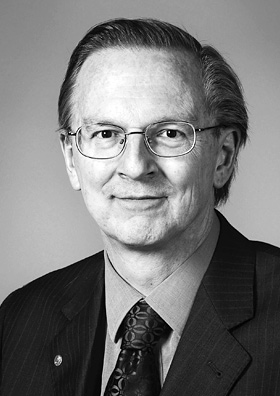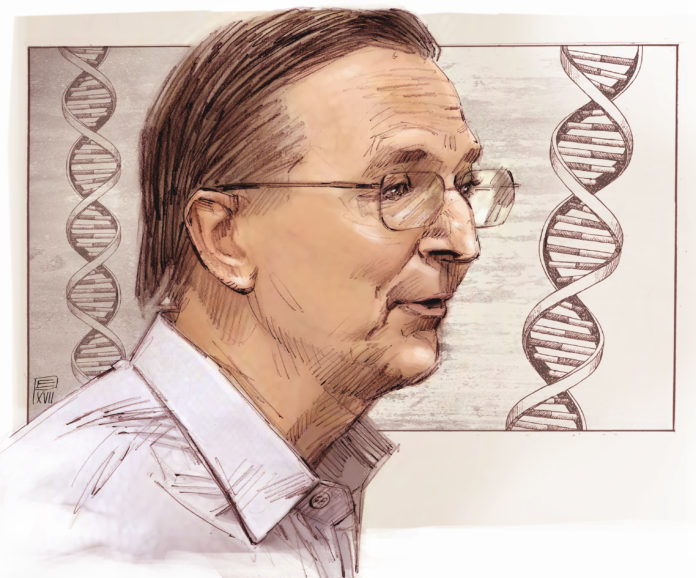08:00 Read papers
10:00 Work on a new paper
12:00 Try experiments to create synthetic life in the lab
14:00 Plan tutoring with graduate students
15:00 Committee meetings at Harvard
17:00 Try to find an answer to the chemical origin of life on Earth
20:00 Conference for university students
22:00 Dinner
Perhaps this is what a regular day looks like for Professor Jack William Szostak (London, 1952), a leading Canadian-American molecular biologist at Harvard, who was awarded the Nobel Prize in Medicine in 2009 for his studies on telomerase, a enzyme that protects chromosomes from destruction.
The award was shared with Elizabeth Blackburn and Carol Greider, both distinguished researchers and professors at the University of California and the John Hopkins University School of Medicine, respectively.
«An organism’s genes are stored within DNA molecules, which are found in chromosomes inside its cells’ nuclei. When a cell divides, it is important that its chromosomes are copied in full, and that they are not damaged. At each end of a chromosome lies a «cap» or telomere, as it is known, which protects it. After Elizabeth Blackburn discovered that telomeres have a particular DNA, through experiments conducted on ciliates and yeast, she and Jack Szostak proved in 1982 that the telomeres’ DNA prevents chromosomes from being broken down,» according to the statement released by the Alfred Nobel Foundation.
Szostak, a researcher at Massachusetts General Hospital, became a prominent scientist long before his Nobel prize. Born in London, but educated in Canada and the United States, at 19 he began his doctorate at the prestigious Cornell University. Professor Jack helped create a gene mapping technique in mammals, designed innovative genetic manipulation techniques, and trained dozens of researchers who now excel in the world’s leading universities.
In the midst of so much work, Szostak devoted a few minutes to Ciencia del Sur to talk about the importance of science, his research on synthetic life, and the chemical origin of life on Earth.
The Harvard biologist, who contributed to the Human Genome Project, assures there is no single and univocal definition of life, but that his work does not address this epistemological and bioethical question, rather focusing on the path that chemistry prepares for biology. He also told us that scientific education and the popularization of science remains an important endeavor.
– How long did you take to make the first yeast artificial chromosome (YAC)?
This work was done by one of my first graduate students, Andrew Murray, now an eminent professor at Harvard. We thought we had all the needed pieces, bur first designs did not work, and it took a while to figure out what was missing – we had to make the chromosome longer. So it took over a year.
– Your work helped us to better understand chromosomal recombination and how telomeres function. Did you expect to change paradigms within science?
No, not really, we were just interested in solving some long standing puzzles. It took years for the implications of our work on telomeres, for example, which are important for cancer and aging, to become apparent.
– What was your work or contribution in the Human Genome Project?
This was pretty minor: yeast artificial chromosomes were used as a way of handling large pieces of DNA, so they could be fragmented and sequenced. The large pieces in YACs also helped to order distant bits of sequence data. However, the role of YACs was soon overtaken by BACs (bacterial artificial chromosomes).
– Is synthetic life possible? Will we ever create living organisms in a lab or is it science fiction? What will they look like?
I think it is possible, and it is in fact the goal of my laboratory. It’s hard to say how long it will take —maybe a few years, maybe many more years if there are unexpected future problems.

– What is the future of molecular biology? What will molecular biologists work on?
There is still much to do to understand how cells, and more complex organisms, really work. We don’t even know the function of many genes, perhaps 1/3 of all genes. And then there are the applications to health and disease, in humans and in agriculture. Molecular biologists will be busy for the foreseeable future.
– What is you current research focus? Something about the origin of life on our planet?
Yes, we are trying to learn how life emerged from the chemistry of the young Earth. Once chemistry gave rise to the building blocks of biology, how did those chemicals assemble into the first simple primitive cells? How did those cells grow and divide, and start to evolve? What environments nurtured early forms of life? These are the questions that occupy us.
– Why are science and research important for developed and developing countries today? Should all nations fund research?
Yes, of course. It makes more sense for developing economies to invest more in research that is more directly related to their practical needs, in medicine, agriculture or energy for example. However, as a country’s economy grows, it should begin to invest more in fundamental research, which is the source of all future advances. If all research is short term, then bigger but longer-term advances will not be possible.
– Is there a single definition of life? What does that word mean to you?
No, life is used to describe several different things, which leads to a lot of confusion. For my work, we avoid arguing about the definition of life and concentrate on understanding the pathway from chemistry to biology.
– What is the daily routine of a Massachusetts General Hospital teacher?
I have a very varied schedule. Sometimes I am writing papers, working with students, and discussing experiments. Some days I have committee meetings, including student advisory committees at Harvard and at Harvard Medical School. Other days I may be traveling to science conferences or to give lectures.
– You have won the Genetics Society of America Medal, the Nobel Prize, the Lasker Award, among others, for your different accomplishments. But, in your opinion, what has been your main contribution to science?
That’s hard to say. Our work on telomeres had impact in that sense that once the roles of telomeres in cancer and aging were realized, many other people started working on those problems. However, my work on directed evolution as a way of discovering new RNA, DNA, and proteins sequences that could do interesting things, such as bind to target molecules or catalyze reactions, is more fundamental and may be more significant in the long run. And of course, I am most excited by our current work on the origin of life, which is a truly fundamental question.
– Has your life changed after winning the Nobel Prize? Do you continue to work and publish papers as before?
My life became busier, but I still do science and write papers. The Nobel also opened up new opportunities to try to encourage young scientists, and to raise support for science.
– Were there other scientists and technicians who helped you during these decades?
I collaborated mostly with Elizabeth Blackburn on our early work on telomeres. Liz and her student Carol Greider, and I, shared the Nobel Prize in 2009, many years after our early key work was done.
– How do you teach genetics at Harvard? Is it different from other universities and hospitals?
I do not teach large lecture classes, although I do give some guest lectures in various courses. But my most important role is to work with the graduate students in my lab, and to help advise students in other labs.
– Last April thousands of scientists took to the streets in the U.S. and many countries to demand more support of research. Is science in danger?
Yes, there is a big danger in the lack of critical thinking. We see people refusing to vaccinate there children because of false stories, and we see many people not believing in important facts such as climate change. As a result, we are seeing disease outbreaks that should not happen. And we see incorrect energy policies that will be harmful to the whole world.
-How do you see science in the 21st century? Will it help us more than in other times? Are we going to discover much more about nature?
I think a good understanding and appreciation of science is essential. The world faces huge problems in medicine, energy, transportation, and information technology. Advances in science are more important now than ever. Of course that is not enough by itself —we need an educated global population and leaders who will lead and support good policies.
What did you think of this article?
Director ejecutivo de Ciencia del Sur. Estudió filosofía en la Universidad Nacional de Asunción (UNA) y pasó por el programa de Jóvenes Investigadores de la UNA. Tiene diplomados en filosofía medieval y en relaciones internacionales.
Condujo los programas de radio El Laboratorio, con temática científica (Ñandutí) y ÁgoraRadio, de filosofía (Ondas Ayvu).
Fue periodista, columnista y editor de Ciencia y Tecnología en el diario ABC Color y colaboró con publicaciones internacionales. Fue presidente de la Asociación Paraguaya Racionalista, secretario del Centro de Difusión e Investigación Astronómica y encargado de cultura científica de la Universidad Iberoamericana.
Periodista de Ciencia del Año por el Consejo Nacional de Ciencia y Tecnología (2017). Tiene cinco libros publicados.















